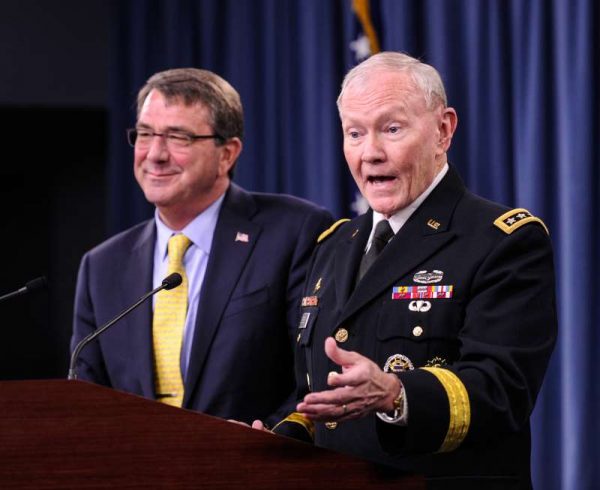By Arun Kumar
Pressing forward with the rebalance to the Asia Pacific region, the US “will deepen our security relationship with India” as part of its new National Military Strategy taking into account erosion of America’s comparative advantage.

Looking at the “increasing disorder in the world”, the three-point strategy is pinned on “Deter, deny, and defeat state adversaries; Disrupt, degrade, and defeat violent extremist organisations; and Strengthen our global network of allies and partners”.
“Since the last National Military Strategy was published four years ago, global disorder has trended upward while some of our comparative advantages have begun to erode,” chairman of the Joint Chiefs of Staff Martin Dempsey said releasing the strategy on Wednesday at the Pentagon.
“America still maintains the most powerful military in the world, but other countries are investing heavily in military capabilities,” he said.
“In this context, the 2015 strategy recognizes that success will increasingly depend on how well our military instrument supports the other instruments of national power and how it enables our network of allies and partners,” Dempsey said.
The new strategy describes “America’s global network of allies and partners” as “a unique strength that provides the foundation for international security and stability”.
“The presence of US military forces in key locations around the world underpins the international order and provides opportunities to engage with other countries while positioning forces to respond to crises,” it said.
“Therefore we will press forward with the rebalance to the Asia Pacific region, placing our most advanced capabilities and greater capacity in that vital theatre,” the strategy said.
“We will strengthen our alliances with Australia, Japan, the Republic of Korea, the Philippines, and Thailand.”
“We also will deepen our security relationship with India and build upon our partnerships with New Zealand, Singapore, Indonesia, Malaysia, Vietnam, and Bangladesh,” the strategy said.
“Such efforts are essential to maintaining regional peace and building capabilities to provide for missile defence, cyber security, maritime security, and disaster relief,” it said.
The US, Dempsey said, was also trying to build a network to combat the “trans-regional” Islamic State of Iraq and the Levant group (ISIL).
“We’re trying to build a framework — a scaffolding — to address this problem trans-regionally in an enduring way so… their defeat lasts, which means there are other lines of effort that have to move along with the military line,” he said.
Anything the US does against ISIL must be sustainable, Dempsey said.
“We’ve got challenges across not just from Afghanistan and Nigeria, but we’ve got a few others things we’re working as well,” he said. “So we’re trying to balance all this out.”
“We will keep pressure on them, and they will eventually collapse under the weight of their own contradictions with a little help from coalition partners, partners and stakeholders in the region and military power,” Dempsey said.